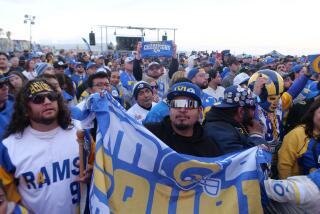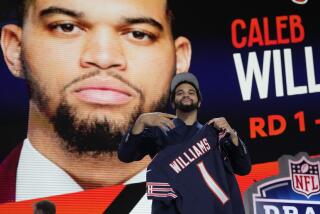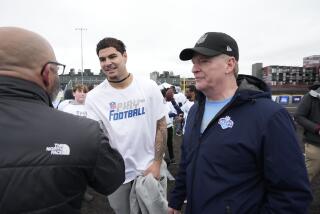THE NFL DRAFT : Caught IN THE Draft : Except for the Players Who Are Certain Successes or Proven Failures, Trying to Enter the NFL Early Usually Results in Late Regrets
The 20 undergraduates who made themselves available for the 1990 NFL draft and weren’t selected had reasons for giving up their remaining college eligibility.
Most of those reasons, however, weren’t good ones. One tailback from a small Oregon trade college, despondent over a breakup with his girlfriend, dropped out of school and decided it was time to move up to the NFL, as if that were a natural progression.
Another player had a brother who was once a kicker at the University of Kansas, so he attempted to confuse the scouts by declaring himself a kicker, too.
Dirk Borgognone was indeed a kicker at the University of Pacific, but was so erratic that his coach limited his duties to kickoffs.
“Geez,” Pacific Coach Walt Harris remarked. “When you can’t even kick for us . . . “
John Tregellas, a one-time defensive end from Sacramento Community College, might as well have declared for the draft as a kicker, too.
“Worst move I ever made,” he said. “I got some real bad info.”
It started with a real bad hangover. Tregellas began his career at the University of Arizona, made a stop at Sacramento JC, then ended up at the University of Idaho, where he was kicked out of school in the aftermath of a bar fight.
“Going into the draft as a junior with no film, that’s crazy,” he said. “I’ve got to get some film.”
Bad karma, bad grades, bad agents--all are in the list of reasons given by marginal players who came out early. For every Jeff George who leaves school early and makes a first-round fortune, several fringe players take the NFL plunge and comes up empty. According to the NFL, not one of the 20 undrafted players in 1990 was a serious prospect.
“It’s not like we were luring undergraduates out,” NFL spokesman Greg Aiello said. “We still say that it’s in the best interest of the overwhelming majority of college players to stay in school, fulfill their eligibility and get their degrees.”
Fearing it would lose a court challenge on the issue, however, the NFL has relented in allowing undergraduates to go through the NFL draft, provided they have completed three years of schooling.
There are loopholes.
Someone named Tommy Woodward put his name on the list last year, despite never having played in college. So did Bryan Tracy. Kicker Michael Culberhouse couldn’t make the traveling squad at Lamar, yet his name appeared on last year’s list of 38 petitioning undergraduates.
More amazing was that Lamar athletic department officials actually fielded phone calls from pro scouts inquiring about Culberhouse’s credentials.
Aiello said there is no stopping such frivolous filings.
“The determination is not based on football skills,” Aiello said of the petitioning system. “Whether they’re good enough to play in the league, that’s what the club determines.”
Chuck Petitpas acknowledged that he had taken advantage of the system.
A kicker from tiny McGill College in Canada, Petitpas drew more attention to himself by coming out early, he said, noting that he joined an impressive NFL short list that included
quarterback George, Junior Seau, Mark Carrier, Rodney Hampton and Keith McCants.
“I did it to get publicity,” he said. “And it worked. I got a tryout in New England. People were saying, ‘Who in the hell is this Chuck Petitpas guy?’ ”
They are still saying it most places west of Ottawa, where Petitpas recently signed with the Roughriders of the Canadian Football League.
Several among the 20 declared for the draft after having failed to stay academically eligible. Some cited financial hardship. They saw the draft as quick money.
Robert Haynes was a highly touted prospect as a high school tailback in Houston. But he elected to stay home after high school to help support his parents, both of whom were unemployed. Two years later, his parents back at work, Haynes returned to football at Greenville College in Greenville, Ill. It’s a small school that does not offer athletic scholarships.
Last season, Haynes fell $6,000 behind in student loans and was forced to leave school.
“I wanted to finish,” he said. “But after the bills piled up so high, I figured that (the draft) was my best chance. They told me I was a longshot.”
Haynes is working at a warehouse in Denver while he awaits a tryout with the city’s Arena Football team, the Denver Dynamite. He said he has trimmed his student loan to $4,000 and hopes to return to school for his degree.
The price for declaring early was steep for the few who might have improved their chances with another season.
Brad Gaines, a Vanderbilt running back, was the top receiving back in the Southeastern Conference his junior season. But his team was switching to a wishbone offense and Gaines’ role figured to be reduced as a senior. Gaines rolled the dice.
“I had seen all these juniors coming out,” he said. “I thought maybe they knew something I didn’t.”
Gaines, though, made a mistake by not declaring until three weeks before the draft. (This year, declarations had to be made by Feb. 1.)
Gaines recently failed a tryout with the Orlando Thunder of the World League of American Football, although he said he was the best back in camp.
“If nothing happens this year, well, you can’t spend the rest of your life chasing something,” he said.
The most famous of the undraftables was Notre Dame fullback Braxston Banks, who took his cause to court in an attempt to restore his senior year of eligibility. In a case litigated by Ralph Nader’s law firm in Washington, Banks argued that the NCAA’s refusal to allow him to return for his senior season of football violated antitrust laws.
Banks’ request, however, was denied by a U.S. District Court judge.
Banks acknowledges having been naive when he decided to declare himself eligible. The coaching staff at Notre Dame begged Banks to reconsider. He had suffered a serious knee injury the second week of his junior season and was, at best, a question mark in the eyes of NFL scouts. A solid, injury-free senior season might have made the difference.
Banks, however, thought his time had come. School wasn’t a problem. Twenty-three years old at the time, Banks had earned his degree in English and business and would have returned to Notre Dame as a postgraduate student.
Banks clearly misjudged his draft value.
“I thought I would go low, but I didn’t know I wouldn’t go at all,” he said.
Banks now works in the research department of the NFL Players Assn., a branch of the decertified union that provides a wide range of information for inquiring players. Banks could have used such information a year ago.
“There wasn’t enough information out there within my grasp,” he said. “I didn’t know about the NFLPA. I didn’t know I could call them and they could help with my decision. I didn’t know they could make calls. I didn’t even think about it. I don’t know what was going through my mind.”
Banks hopes he can prevent others from making the same mistakes. “With any decision you make, there are always questions,” he said. “I can’t say I regret it. I’d just make sure I had a little more information, such as how I was perceived within the league.”
Banks hasn’t given up on an NFL career, but concedes his chances are fading. He plans to start law school soon with the goal of becoming a sports attorney.
“My ultimate goal is to bring some awareness, to make these gentlemen aware of what it’s really like out there,” he said.
Banks and 19 others learned the hard way. Here’s a capsule look at each of the 1990 undraftables:
Sean Barowski, running back, Syracuse. Apparently, he and the coach didn’t get along, so Barowski, a transfer from Penn State, made himself available to the NFL after gaining 13 yards in four carries--in his career.
Conclusion: Barowski should have made up with his coach.
Eugene Burkhalter, defensive back, Washington. A close friend of USC’s Mark Carrier, he was quoted on draft day as saying he would go in the first five or six rounds. He had had a good junior season, leading the team with 100 tackles, but lacked speed. He was most recently released by the Barcelona Dragons of the WLAF.
Conclusion: He missed out on a senior season in which Washington appeared in the Rose Bowl and competed for a national championship.
Anthony Burnett, defensive back, UCLA. A promising career was slowed when Burnett suffered a broken leg in an automobile accident as a redshirt freshman. Burnett was declared academically ineligible before his junior season and dropped out of school.
Conclusion: After flunking out, he had nothing to lose in testing the NFL market, but he never had a chance.
Danny Cash, offensive tackle, Alabama. When asked what had become of Cash, a spokeswoman in the university’s sports information office replied, “I have no earthly idea.” Cash played sparingly for the Crimson Tide and dropped out of school before his senior season.
Conclusion: See Anthony Burnett.
Octavius Gould, running back, Minnesota. He had a first-round name, no doubt. He left school after having been suspended from spring practice for academic reasons. His coaches wanted him to go to summer school and return in the fall, when he was expected to replace Darrell Thompson at tailback. He was last reported to be working in the insurance business in Tampa.
Conclusion: Gould’s offensive coordinator at Minnesota, Jim Hueber, said it best: “Unless you’ve got No. 1 stamped all over you, I think it’s a bad decision.”
Thurman Geathers, running back, Oregon Tech. A one-time junior college star, he wanted to follow his brother, James Geathers of the Washington Redskins, into the NFL. A serious knee injury landed him instead at the college in Klamath Falls.
“If he had not hurt his knee, he wouldn’t have been here,” said his coach, Craig Howard. “He was a Southwest Conference kind of kid.”
After a breakup with his girlfriend, however, Geathers dropped out of school and returned home to South Carolina.
Conclusion: Had Geathers stayed in school and earned his degree, Howard said the player could have landed a high-paying technical job in the area.
Jeff Klemp, kicker, Kansas. Klemp’s brother, Louis, was a kicker for the Jayhawks a few years back, but Jeff was a walk-on defensive end who never put foot to ball in college.
Conclusion: Klemp might have a career in self-promotion. “We’ve had more calls about him than any kid who ever played at Kansas, including Danny Manning,” SID Doug Vance reported. “He was never a kicker here.”
Chris Mongeau, offensive lineman, American International College. Mongeau was a walk-on freshman at the school in Springfield, Mass., but did little more than fetch water for Coach Alex Rotsko, who almost swallowed his whistle when he learned Mongeau was applying for the NFL draft.
Conclusion: Never overestimate the intelligence of walk-on freshmen.
John Mefford, defensive tackle, Carson-Newman College. No harm done here. At the time of declaration, Mefford was weeks away from wrapping up a degree in business management, so he decided to throw his name into the NFL draft hat for the heck of it. “He was just a longshot and he knew that,” assistant coach, Bill Mitchell said.
Mitchell said he believed Mefford was now running a department store.
Conclusion: Calvin Coolidge once said, “The business of America is business.” Coolidge was Mefford’s kind of man.
Leonard Morris, running back, Cal State Hayward. He dropped out of school three games into his junior season after a checkered career and reappeared the following spring on the NFL draft list.
“It was a stunner, oh yeah,” Hayward SID Marty Valdez said. “We started getting calls from scouts who wanted film. You’re talking about a guy who was in on 18 plays.”
Morris did get a tryout with the CFL’s Toronto Argonauts.
Conclusion: Family problems and finances might have influenced Morris’ decision to try the draft, Valdez said.
Cornelius Price, defensive back, Houston. He was recruited to Houston by one-time assistant Pat Thomas, the former Ram cornerback who now coaches with the Houston Oilers. Price became academically ineligible his junior season and was not willing to attend summer school to improve his grades, a school spokesman said.
Conclusion: Price was a 5-foot 9-inch, 180-pound cornerback with average speed. That doesn’t go over well in the NFL.
Tommy Woodward, defensive back, Murray State. According to school officials, Woodward never was so much as fitted for a helmet at Murray State.
“If he played here, it must have been in the ‘50s,” said Sheila Haley of the athletic department. “No one here has heard of him.”
The school’s admissions office confirmed that a Thomas Eldrige Woodward was enrolled for one semester in the fall of 1989.
Said Haley, “He may have passed through Murray State on his way to the lake.”
Conclusion: For all the NFL cared, this could have been Murray Woodward from Tommy State.
Braxston Banks, running back, Notre Dame. With his competitive instincts, Banks perhaps mistakenly compared his talents with those of former teammate and fullback Anthony Johnson, a second-round NFL pick. Notre Dame’s national exposure might have affected Banks’ vision.
Conclusion: Luckily, Banks has it together off the field. Besides working for the NFLPA, he is doing free-lance work for ABC sports. His advice to undergraduates considering the NFL draft: “Be ready for the consequences.”
Dirk Borgognone, kicker, Pacific. Borgognone was having trouble in school.
“Poor old Dirk wasn’t consistent at anything in life,” his college coach said.
In high school, Borgognone kicked a 67-yard field goal. At UOP, he couldn’t kick a pea in the Pacific.
Conclusion: Consider it old fashioned, but the NFL still prefers kickers who try field goals.
Michael Culberhouse, kicker, Lamar. He was a walk-on who never suited up for a game, although rumor has it he practiced several times. But when his named turned up the draft list, phones started ringing.
“We’ve had more calls on this kid than some of our All-Americans,” Lamar’s Rush Wood said.
Conclusion, from Wood: “I’m going to declare myself eligible this year.”
Brad Gaines, running back, Vanderbilt. Gaines didn’t declare early to make a fool of himself.
“If I’d known I wasn’t going to be drafted, I wouldn’t have come out,” he said.
He also filed a lawsuit in an attempt to regain his senior season, but it was shot down early.
His plea to undergraduates: “Tell them it’s a big mistake, unless you’re a certain first-rounder who’s assured of making the big change.”
Conclusion: Another year might have made the difference for Gaines.
John Tregellas, defensive end, Sacramento City College. Chalk up this ill-fated decision to bad advice from an agent.
“It didn’t hinder his career,” Tregellas complained. “That’s no excuse, I’m not a kid. I bought it.”
Conclusion: Tregellas had his sights set on the NFL, but his best shot is to bulk up for a comeback attempt in the WLAF with his hometown team, the Sacramento Surge.
Tregellas: “The Surge? It sounds like a toilet bowl cleaner.”
Chuck Petitpas, kicker, McGill. His country’s equivalent of the NCAA, the Canadian Interuniversity Athletic Union, doesn’t consider you a professional until you sign a contract, so Petitpas could have returned for his senior season. Petitpas was only a few units short of graduating and had nothing to lose by coming out.
Conclusion: The Canadian system appears a bit more equitable, eh?
Robert Haynes, running back, Greenville College. He spent time in the Raiders’ mini-camp last spring, where Coach Art Shell reportedly told Haynes he had a future at wide receiver.
Conclusion: Haynes is 5-5, 155 pounds, and runs a 4.5 40-yard dash, which makes him a prototype run-and-shoot receiver. He should visit the offices of the WLAF’s New York-New Jersey Knights, coached by run-and-shoot pioneer, Mouse Davis.
Bryan Tracy, running back, no school. A year later, the NFL personnel department reports it doesn’t remember anything about Tracy. He didn’t leave a resume or forwarding address. An NFL spokesman confirmed he was a running back, and was granted draft eligibility.
Conclusion: Sounds like a case for Dick Tracy.
More to Read
Go beyond the scoreboard
Get the latest on L.A.'s teams in the daily Sports Report newsletter.
You may occasionally receive promotional content from the Los Angeles Times.











